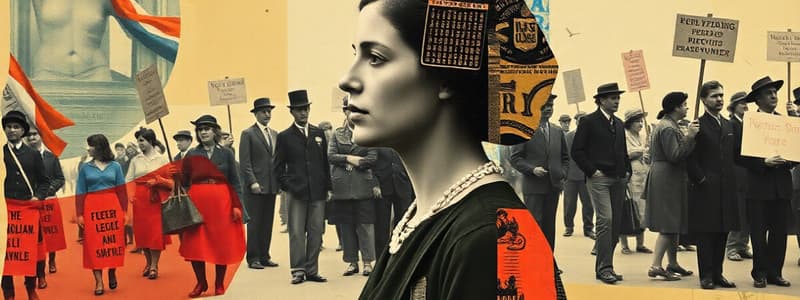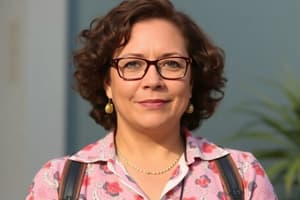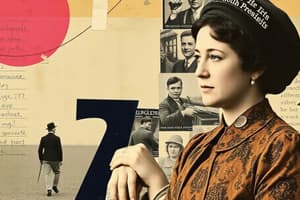Podcast
Questions and Answers
Abby led a series of antislavery meetings in Seneca Falls in 1843, long after the women's rights convention was held there.
Abby led a series of antislavery meetings in Seneca Falls in 1843, long after the women's rights convention was held there.
False (B)
The audience at Abby's meetings reacted positively to her accusations against the northerners.
The audience at Abby's meetings reacted positively to her accusations against the northerners.
False (B)
Abby and Stephen Foster's protest against real estate taxes lasted only a year.
Abby and Stephen Foster's protest against real estate taxes lasted only a year.
False (B)
Abby Foster and her husband were ultimately punished by the government for their refusal to pay taxes.
Abby Foster and her husband were ultimately punished by the government for their refusal to pay taxes.
The phrase 'taxation without representation' was first used by Abby Foster during her protests.
The phrase 'taxation without representation' was first used by Abby Foster during her protests.
Lucy Stone, who spoke at Abby's auction meeting, was a well-known suffragist and supporter of Abby's cause.
Lucy Stone, who spoke at Abby's auction meeting, was a well-known suffragist and supporter of Abby's cause.
Lecturing was a common form of entertainment before the invention of radios and televisions.
Lecturing was a common form of entertainment before the invention of radios and televisions.
Abby Foster had no impact on future suffragists, as they did not credit her for their inspiration.
Abby Foster had no impact on future suffragists, as they did not credit her for their inspiration.
Abby Kelley was born into a wealthy aristocratic family.
Abby Kelley was born into a wealthy aristocratic family.
Abby Kelley is often compared to a biblical villain named Jezebel.
Abby Kelley is often compared to a biblical villain named Jezebel.
Abby Kelley rose to prominence solely through formal political channels.
Abby Kelley rose to prominence solely through formal political channels.
She was often welcomed to speak at churches and town halls.
She was often welcomed to speak at churches and town halls.
A mob destroyed the lecture hall where Abby Kelley spoke, just four days after its completion.
A mob destroyed the lecture hall where Abby Kelley spoke, just four days after its completion.
Abby Kelley received encouragement to continue speaking from her audience members.
Abby Kelley received encouragement to continue speaking from her audience members.
Abby Kelley educated herself by learning from her peers in the boarding school.
Abby Kelley educated herself by learning from her peers in the boarding school.
The speeches Abby Kelley delivered were only directed at white audiences.
The speeches Abby Kelley delivered were only directed at white audiences.
Flashcards
Abby Kelley Foster
Abby Kelley Foster
Abby Kelley Foster was an activist who fought for both abolition and women's suffrage. She believed in speaking her truth, even when it was unpopular, and took a stand against injustice.
Northerners and slavery
Northerners and slavery
Abby Kelley Foster accused northerners of being complicit in slavery by not using their power to end it.
Taxation without representation
Taxation without representation
Abby Kelley Foster and her husband Stephen Foster refused to pay taxes because they believed women didn't have representation in government.
Protest against taxation
Protest against taxation
Signup and view all the flashcards
Abby Kelley Foster's legacy
Abby Kelley Foster's legacy
Signup and view all the flashcards
Suffrage and speaking tours
Suffrage and speaking tours
Signup and view all the flashcards
What are lyceums?
What are lyceums?
Signup and view all the flashcards
Remembering past sacrifices
Remembering past sacrifices
Signup and view all the flashcards
Who was Abby Kelley Foster?
Who was Abby Kelley Foster?
Signup and view all the flashcards
What were Abby Kelley Foster's views on abolition?
What were Abby Kelley Foster's views on abolition?
Signup and view all the flashcards
How did people react to Abby Kelley's abolitionist speeches?
How did people react to Abby Kelley's abolitionist speeches?
Signup and view all the flashcards
What was Abby Kelley known for in her speeches?
What was Abby Kelley known for in her speeches?
Signup and view all the flashcards
Describe the incident at the Philadelphia lecture hall.
Describe the incident at the Philadelphia lecture hall.
Signup and view all the flashcards
What did Abby Kelley say during the Philadelphia incident?
What did Abby Kelley say during the Philadelphia incident?
Signup and view all the flashcards
What happened to the lecture hall in Philadelphia?
What happened to the lecture hall in Philadelphia?
Signup and view all the flashcards
What can we learn from Abby Kelley's story?
What can we learn from Abby Kelley's story?
Signup and view all the flashcards
Study Notes
Abby Kelley Foster
- Abby Kelley Foster, born in 1811, died in 1887, was a prominent abolitionist and women's rights advocate.
- Early in her life, she faced criticism and opposition for her outspoken views on abolition and women's rights.
- She was a teacher and advocated for the education of all genders and classes.
- In 1829 she embarked on a career in teaching and began to be influenced by antislavery activities.
- She became an outspoken abolitionist, championing the causes of both slaves and women.
- This advocacy made her an outcast, denied access to churches and public spaces.
- Her methods included outdoor meetings and confrontational speeches.
- She faced resistance and violence from those opposed to her views, including being pelted with fruit and stones.
- Abby Kelley was a compelling public speaker who influenced many.
- She contributed to the development of the women's rights movement.
- She co-organized events alongside prominent figures such as Lucretia Mott.
- She advocated for women's full rights and equal treatment.
- She and Stephen Foster challenged the law by refusing to pay taxes as a protest against taxation without representation.
Suffragist Movement
- The suffragist movement gained strength through speaking tours, with lectures and rallies as common forms of activism.
- Lectures were popular methods of organizing and spreading ideas.
- Public speaking platforms became crucial for the suffragist movement.
Abby Kelley Foster's Later Life
- She was a mentor to notable figures in the women's rights movement.
- Fostered relationships with leading figures including others involved in the abolitionist movement.
- She helped women's rights activists learn methods of organizing and speaking effectively.
- She strongly advocated for her views and principles.
- Became involved in the Underground Railroad and actively participated in the anti-slavery movement by supporting the freedom of those enslaved.
Studying That Suits You
Use AI to generate personalized quizzes and flashcards to suit your learning preferences.
Related Documents
Description
Explore the life and impact of Abby Kelley Foster, an influential abolitionist and advocate for women's rights. Born in 1811, she faced significant opposition while championing the causes of equality and education for all. This quiz delves into her methods, public speeches, and the challenges she overcame in her advocacy.




